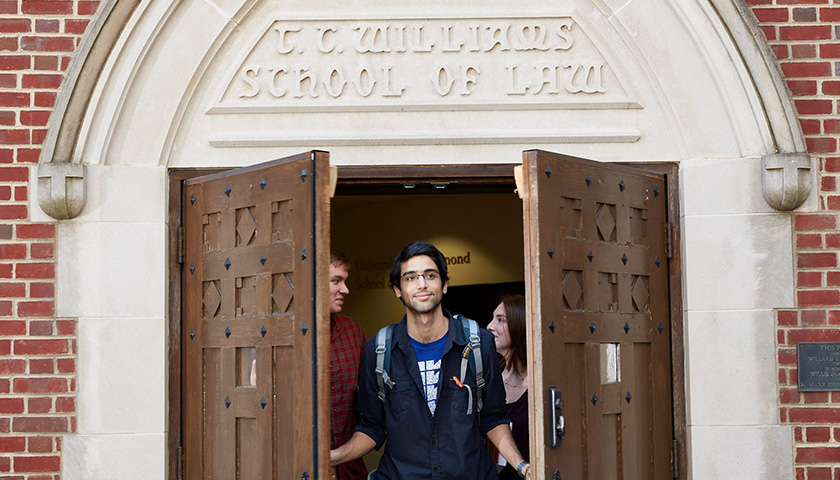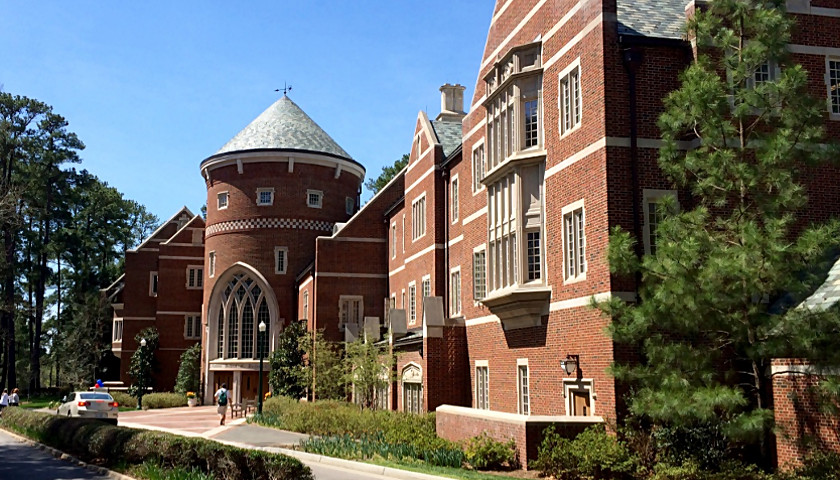by Rafael Oliveira
The University of Richmond recently removed the name of T.C. Williams, an early benefactor, from its law school because of his alleged ownership of slaves in the 19th century.
But his descendants say Williams contributed to the demise of slavery and now argue the university should refund Williams’ previously donated money to the institution.
“If suddenly his name is not good enough for the University, then isn’t the proper ethical and indeed virtuous action to return the benefactor’s money with interest? At a 6% compounded interest over 132 years, T.C. Williams gift to the law school alone is now valued at over $51 million, and this does not include many other substantial gifts from my family to the University,” Rob Smith, Williams’ great-great-grandson, said in a letter to President Kevin Hallock.
“Moreover, is it not a form of fraud to induce money from a benefactor, and then discredit the benefactor after he is long dead? Surely, the Williams family would not have given a penny to the University knowing that the University would later dishonor the family. The ethical and virtuous decision is clear. Return the money.”
Thomas C. Williams attended Richmond College from 1846 to 1849 and was a trustee in the 1880s, the Richmond Times-Dispatch reported.
“After his death, his family made a gift to UR that helped establish the law school. When Richmond College became the University of Richmond in 1920, it began referring to the law school as the T.C. Williams School of Law,” the newspaper reported.
Smith, in an email this month to The College Fix, said “We have sent [President Kevin] Hallock 20 emails asking for the evidence that the university used to state that T.C. Williams had a connection to slavery and how these documents were compiled, and he has refused to give us this information and has refused to discuss these issues with us.”
In a statement provided Tuesday to The College Fix, spokesperson Cynthia Price said the University of Richmond board voted unanimously in the fall of 2022 “to change the official name of the law school from the T.C. Williams School of Law to the University of Richmond School of Law.”
“The law school has been referred to as the University of Richmond School of Law for more than 20 years,” Price said.
She did not address the controversy in her statement to The Fix.
The University of Richmond reserves the right to remove the name of a person who directly engaged in the trafficking or enslavement of others or someone who openly advocated for the enslavement of people, according to its naming guidelines.
Hallock, in a September 2022 email to the university community, stated that “Recently located government records dating from 1857 to 1863, and a newspaper notice from 1864, document Williams’s involvement in enslavement as an individual and through businesses in which he had direct ownership and an active management role.”
“… Personal property tax records from several Virginia localities that show Williams’s businesses being taxed on 25 to 40 enslaved persons in those years,” he wrote.
Williams’ family deny any malicious intent between their ancestor and the institution of slavery.
“The university has basically refused to discuss these issues with us,” Smith told The Fix. “We have not pressed them on returning the money, but we keep finding out about new gifts that the Williams family gave them.”
President Hallock acknowledged in his email that “some may be disappointed or disagree with this decision. We also recognize the role the Williams family has played here and respect the full and complete history of the institution. Consistent with Principle 9 of the Naming Principles, we will preserve and make accessible a full historical record.”
However, the university has not allowed Smith or his brothers to defend Williams before the Board of Trustees, or provided the grounds for Williams’ wrongdoings, the family reported.
Williams’ family also contends that the decision to remove Williams’ name is based on erroneous grounds.
“Despite the university’s naming ‘principles’ requiring transparency and the promise of creating a complete and objective record, I contend that a complete and objective record could not possibly end in the de-naming of my great great grandfather,” Walter Smith, another of Williams’ descendants and a UVA alumnus, said in an email to The Fix. “We want our day in ‘court’— an appearance before the Board.”
Smith said Williams actually helped slaves rather than oppressed them.
“Perhaps true academics could recognize that the achievements of people like T.C. Williams contributed to the demise of slavery and created a bold economic and social order that gave men the opportunity to make a living for themselves and the human dignity derived from such efforts?” he wrote in his letter to President Hallock
“Against all odds, T.C. Williams amassed a great fortune,” Smith continued. “He may have been the wealthiest man in Virginia at his death. And what did he do with his wealth? He hired thousands of workers, many were blacks and women. Productive work and industry is the only thing that lifts people out of poverty. The Williams family gave away all of their immense wealth, most of it was anonymous and there were substantial inter-vivos gifts. Many Richmond institutions are the result of their goodwill and generosity.”
Stu Smith, another member of the Williams family, compared the assessment of Williams to incidents where local municipalities “cancel” historical figures for their mistakes, which he thinks are not to be compared with their achievements for good.
“We are seeing the local school board finding people like George Wythe to be a problematic person to name a school after because he owned slaves,” Stu Smith told The College Fix via email. “In his own life, his thoughts on slavery changed and he was probably the most progressive Founding Father. He emancipated all his slaves at the end of the American Revolution. The nuance on this is lost on many modern people. No metric is good enough, even the slightest taint of slavery makes someone radioactive.”
“If American Society can not find a way to integrate the shameful aspects of our own history then we are not long for this world as a nation,” he added. “We don’t need to romanticize our history, but canceling historical figures isn’t the answer. The answer is Nuance! The answer is accepting that humanity is capable of great evil and great good. We are imperfect.”
In Rob Smith’s letter to Hollack he also pointed out the hypocrisy of the institution.
“The University itself participated in slavery! Using your Orwellian logic, then shouldn’t the University have to change its name? … Using your T.C. Williams logic, then don’t you have to resign since you preside over a school that participated in slavery,” Smith wrote.
“Since all history has to be erased, perhaps you can eliminate the history department and use the money to buy therapy dogs, cupcakes and cotton candy for all those poor souls triggered by facts. Then again, you could use the money to bolster your Campus Ministry of Truth and just eliminate facts. After all, facts are bad, they make snowflakes cry.”
– – –
College Fix contributor Rafael Oliveira is a student at The King’s College studying politics, philosophy and economics. His work has also appeared in the Empire State Tribune and Empire State Magazine.
Photo “T.C. Williams School of Law” by University of Richmond School of Law.





